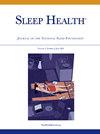Social jetlag is associated with body mass (BMI) in children aged 2-8 years: A cross-sectional analysis
IF 3.4
2区 医学
Q2 CLINICAL NEUROLOGY
引用次数: 0
Abstract
Objective
Social jetlag is associated with higher body mass index (BMI) in adults, adolescents, and older children. However, no research to date has addressed social jetlag and body mass index in early childhood. This study investigated the association between social jetlag and BMIz in children aged 2-8 years.
Methods
Cross-sectional data were leveraged from 1122 children (M = 5.6 ± 1.7 years, 48.8% females) from the NIH Environmental influences on Child Health Outcomes (ECHO) study between 2016 and 2021. Sleep timing was parent-reported. Social jetlag was calculated as the absolute difference in weekend-weekday sleep midpoint. Objective measurements of children’s height and weight were used to compute age- and sex-adjusted BMIz. Regression models tested the association between social jetlag and BMIz, adjusting for sociodemographic and sleep covariates.
Results
After controlling for age, sex, race and ethnicity, primary caregiver education, and average nighttime sleep duration, social jetlag was positively associated with BMIz (β = 0.126, 95% CI: 0.004-0.249, p = .043). Children with ≥1-h social jetlag had higher average BMIz and had 66% higher odds of being overweight or obese (OR = 1.66, 95% CI: 1.13-2.46, p = .01), compared with children with no social jetlag.
Conclusions
Social jetlag may contribute to higher BMIz in young children, similar to findings in older children, adolescents, and adults. At least 1 hour of social jetlag may increase children’s odds of being overweight or obese. Future research is needed to test causality and whether reducing social jetlag can lead to healthy weight-related outcomes.
2-8岁儿童的社交时差与体重(BMI)相关:一项横断面分析。
目的:社交时差与成人、青少年和年龄较大的儿童较高的身体质量指数(BMI)有关。然而,到目前为止,还没有研究涉及儿童早期的社会时差和体重指数。本研究旨在探讨2-8岁儿童社交时差与bmi的关系。方法:从2016年至2021年NIH环境影响儿童健康结局(ECHO)研究中获取1122名儿童(M=5.6±1.7岁,48.8%为女性)的横断面数据。睡眠时间由父母报告。社交时差是根据周末和工作日睡眠中点的绝对差值计算的。使用儿童身高和体重的客观测量来计算年龄和性别调整后的bmi。回归模型测试了社会时差和bmi之间的关系,调整了社会人口统计学和睡眠协变量。结果:在控制了年龄、性别、种族和民族、主要照顾者教育程度和平均夜间睡眠时间后,社交时差与bmi呈正相关(β=0.126, 95% CI: 0.004-0.249, p= 0.043)。与没有社交时差的儿童相比,有≥1小时社交时差的儿童平均bmi更高,超重或肥胖的几率高66% (or =1.66, 95% CI: 1.13-2.46, p= 0.01)。结论:社交时差可能导致幼儿较高的bmi,这与年龄较大的儿童、青少年和成人的发现相似。至少一个小时的社交时差可能会增加孩子超重或肥胖的几率。未来的研究需要测试因果关系,以及减少社交时差是否会导致健康的体重相关结果。
本文章由计算机程序翻译,如有差异,请以英文原文为准。
求助全文
约1分钟内获得全文
求助全文
来源期刊

Sleep Health
CLINICAL NEUROLOGY-
CiteScore
6.30
自引率
9.80%
发文量
114
审稿时长
54 days
期刊介绍:
Sleep Health Journal of the National Sleep Foundation is a multidisciplinary journal that explores sleep''s role in population health and elucidates the social science perspective on sleep and health. Aligned with the National Sleep Foundation''s global authoritative, evidence-based voice for sleep health, the journal serves as the foremost publication for manuscripts that advance the sleep health of all members of society.The scope of the journal extends across diverse sleep-related fields, including anthropology, education, health services research, human development, international health, law, mental health, nursing, nutrition, psychology, public health, public policy, fatigue management, transportation, social work, and sociology. The journal welcomes original research articles, review articles, brief reports, special articles, letters to the editor, editorials, and commentaries.
 求助内容:
求助内容: 应助结果提醒方式:
应助结果提醒方式:


